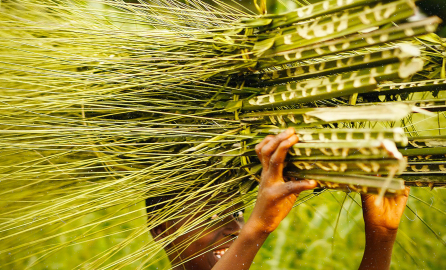Lack of transparency in extractive industries like oil, gas or mining has put the brakes on development in resource-rich countries and exacerbated poor governance, according to campaigners in Ghana where a new initiative is encouraging greater disclosure.
In Ghana, one of Africa’s newest oil exporting nations, the newly established Extractive Industries Transparency Initiative is encouraging companies to disclose what they pay and the government to be transparent about what they receive. International agencies and charities operating in the country are also being encouraged to get involved.
"In Ghana, the climate is good for this initiative," Philomena Johnson, Director of Caritas Ghana and active advocate of the Initiative, told capacity4dev at the 2010 European Development Days.
The EITI advocates that transparency over payments and revenues increases the likelihood that these revenues are used in an efficient and equitable manner and reduce the risk of diversion or misappropriate of resources. Transparency is also key to help citizens hold their government accountable and can assist governments in financial and macro-economic planning.
Though the initiative has been widely welcomed the good practices it advocates have yet to be widely adopted beyond the mining sector.
"This initiative is voluntary and a few mining industries start appreciating what we are doing but we still struggle with gathering relevant data that must come from these companies," she added. To hear more from Ms Johnson, click on the image below:
The mining industry in Ghana, dominated by gold, diamond, bauxite and manganese, is an important source of export and government revenue. For example, gold represented 34% of the country’s exports and 12% of GDP in 2000-2003.
"We are now looking at how we can develop a legal framework to cover the process so that it will be binding for all companies that operate in Ghana to release relevant and timely information for us to analyse and see how it is helping the country", said Ms Johnson.
The Ghana Extractive Industry Transparency Initiative is the Ghana subset of a global initiative launched in 2002 by Tony Blair, then UK Prime Minister, at the World Summit on Sustainable Development in Johannesburg. There are now 32 countries implementing the EITI, 20 of them in Sub Saharan Africa, highlighting the unique governance challenges faced in many countries across the continent.
In the short term, Ghana’s new oil sector and established forestry sector have been targeted by the EITI.
"We are also extending our initiative to the revenue that comes from the oil and forestry sectors", said Ms Johnson.
In December, Ghana became an oil exporting nation and analysts predict the new export could boost economic growth from averages of 5% to as much as 12% by end of this year.
Ghana is a long-term aid recipient and development spending could also be scrutinised by EITI, according to Ms Johnson.
"We should now move beyond these sectors and know how development aid is being used and if things are not moving, we then can go to the partners and say: ‘No, we need to find new ways of doing business’”.

Log in with your EU Login account to post or comment on the platform.